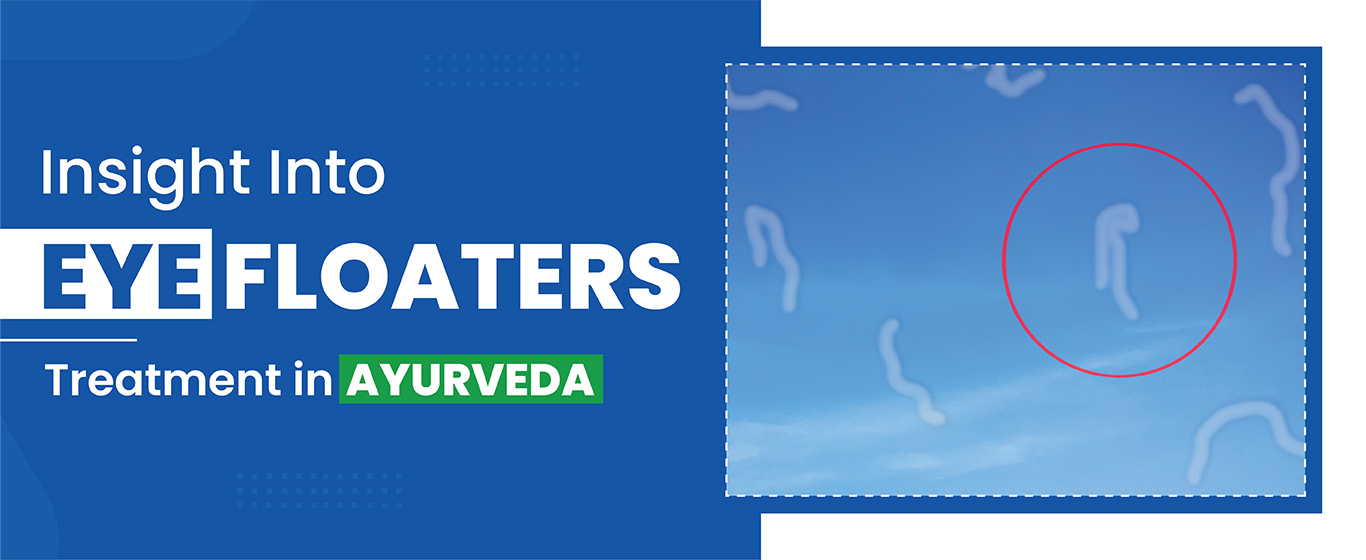
Floaters could be defined as small bits of debris that are drifting across the vision line. They occur in various forms like small black dots or even in large cobweb shapes and are more often reported in people who are getting older or in individuals who mostly suffer from short sightedness. If we define their appearance they may vary from spots, threads, squiggly lines, or even little cobwebs.
If you have noticed floaters that appear suddenly and are impacting your vision for a long time, you need to meet your doctor immediately. For many individuals reporting floaters often don’t need treatment as they come and go but on many occasions it might be a serious eye disorder. Though both conventional and non conventional methods are available for treating eye problems, opting for Eye Floaters Treatment in Ayurveda is the best way to get your eyes checked when impacted by such conditions.
Who is at risk of getting floaters?
It’s true that as you grow old, the risk of having a floater is quite significant but people who suffer from
- Nearsightedness
- Have a family history of diabetes or suffering from diabetes
- Had undergone a surgery of cataract
What causes floaters?
There is a jelly-like substance called vitreous inside the eyes that liquifies and contracts. Dispersed clusters of collagen fibers when they get formed within the jelly-like liquid (vitreous) lead to release of tiny shadows on the retina. The solid portion of the gel i.e dispersed collagen forms debris casting shadows onto the retina, which we see as floaters.
The vitreous is made up mainly of water with a meshwork holding it together and as we get older vitreous syneresis occurs; the meshwork breaks down and lakes form.
About Eye Floater treatment in Ayurveda
Discussing eye floater treatment in Ayurveda involves removing the root cause of this eye problem. The doctors identify this eye disorder of eye floaters as Vata Dosha. In Ayurveda, the therapy majorly concentrates on normalizing the disturbances caused by Vata dosha. The first step is to diagnose the type of eye floaters the patients encounter.
For primary or harmless floaters, the treatment involves panchakarma, and therapies include Siro abhyanga, Netra tharpanam, Sirodhara, etc. In critical cases of floaters experienced due to ocular disorders like uveitis, age-related macular degeneration or diabetic retinopathy, the remedy or cure pushes beyond eye floaters.
In such scenarios, the focus shifts to treating the underlying cause of floaters. However, it differs from patient to patient depending upon the chronicity of the problem. Though the ayurvedic medications for eye floaters are similar in both cases, the treatment scale makes them different.
Imbibing Habits to Prevent Eye Floaters
It is always advised to take preventive measures, or as said, prevention is always better than cure. There are numerous ways to minimize the risk of developing floaters by simply following a few good habits and leaving the bad ones
- Quit smoking
- Wear sunglasses while going outdoors
- You should get a good sleep and rest your eyes regularly, particularly from screens
- Use defensive eyewear if needed
- Try to have a diet that relieves Vata dosha
What vitamins and nutrients can help eye floaters?
Looking at the eye floaters problem and the underlying causes impacting it takes time to treat them once they occur. They have an asymptotic approach, and no fixed or exact therapy is available. Many people live with it, irrespective of how irritating and frustrating it can be.
However, with lots of research and clinical work done recently, enhancing the intake of micronutrients, like zinc,l-lysine, and vitamin C, may aid in improving vision by reducing floaters.
After understanding the promising evidence on l-lysine and the knowledge that vitamin C and how it contributes towards collagen building for the normal function of blood vessels and zinc contributes to maintaining normal vision, these findings aren’t all that surprising. Together, these nutrients are positioned to support many areas of health, including vision.
Conclusion
Eye floaters can be both acute or chronic, where they persist for a longer duration but are seen more in the elderly population. As per Ayurveda, it is due to imbalances in Vata Dosha in the body. Adopting a holistic approach that follows a balanced diet, suggested by an Ayurvedic expert, can help promote eye health and manage floaters effectively.
Also, you can consult experts at Dr Basu Eye Hospital, where you get the right panchakarma therapy, medication, and eye drops that ensure effective and guaranteed treatment for those grappling with eye floaters. With its state-of-the-art facilities and Ayurvedic expertise, Dr Basu Eye Hospital is a one-stop solution for optimal vision and vitality.
You Can Also Read For More Posts:
Holistic Ayurvedic Solutions for Cataract Management
Incorporating Ayurvedic Practices for Eye Treatment without surgery
To Know More, Talk to our Consultant. Dial +91-8235808080.